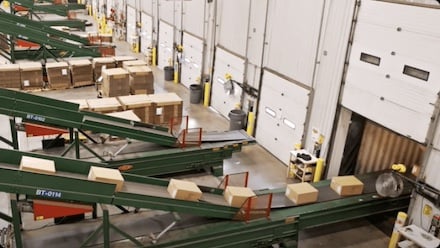Ecommerce retailers operate in an omnichannel system where product demand and orders often fluctuate based on the economy, season, trends or growth. Brands must have an efficient order management system (OMS) to streamline and automate order processing, improve efficiency and reduce errors. Selecting an order management system that provides real-time visibility into inventory levels, order statuses and customer data and enables you to fulfill orders accurately and quickly is crucial for omnichannel operations and creating seamless shopping experiences across multiple sales channels.
Order management system (OMS) defined
An Order Management System – or OMS – is a software solution that streamlines and automates the entire order processing lifecycle, from order placement to fulfillment and beyond. An OMS is a centralized hub where businesses can manage orders across sales channels, including online stores, marketplaces and brick-and-mortar locations. The OMS captures and consolidates order information, inventory levels and customer data in real-time, providing a single source of truth for all order-related activities. It facilitates order routing, allocation and fulfillment optimization, ensuring efficient and accurate order processing.
An OMS can also integrate with other systems like Customer Relationship Management (CRM), Inventory Management and Warehouse Management Systems (WMS), enabling seamless data flow and collaboration across departments. Overall, an OMS empowers businesses to enhance customer satisfaction, streamline operations and scale their order management processes to meet demand and support growth.
Key features and benefits of an order management system
An OMS is more than software – it’s a solution that helps brands reach peak performance. It offers numerous features that benefit businesses and the customers they serve.
OMS features
A modern OMS typically features:
- Order processing automation: Streamlines order fulfillment processes, reducing manual errors and increasing efficiency.
- Inventory management: Provides real-time visibility into stock levels across multiple warehouses and sales channels. Helps reduce chance of excess inventory and stockouts.
- Real-time order tracking: Allows customers to track their orders from purchase to delivery, enhancing transparency and customer satisfaction.
- Integration with multiple sales channels: Enables centralized order management across various online and offline sales channels, ensuring consistency in inventory and order fulfillment.
- Customizable reporting and analytics: Provides insights into sales performance, order trends and inventory movement, helping retailers make informed business decisions.
- Customer relationship management (CRM) capabilities: Stores customer information and order history, enabling personalized interactions and targeted marketing campaigns.
- Support for omnichannel fulfillment options: Lets retailers offer flexible fulfillment options such as ship-from-store, buy online pick up in-store (BOPIS) and same-day delivery, meeting diverse customer preferences and expectations.
OMS benefits
Order management systems can benefit brands from streamlining operations to cost savings. OMS benefits include:
- Enhanced efficiency: Streamlines order processing, reducing manual errors and speeding up fulfillment processes.
- Improved inventory management: Better demand forecasting and real-time information, minimizing stockouts and overstocking.
- Better customer experience: Gives ecommerce businesses the ability to better meet consumer expectations and helps create a more seamless end-to-end customer experience. Optimizes the post-purchase experience.
- Data-driven insights: Empowers retailers to make better data-driven decisions.
- Scalability: Adapts to the evolving needs of the business, supporting growth and expansion into new sales channels and markets.
- Unified commerce: An OMS’s ability to centralize and unify information supports a unified commerce strategy.
Why do you need an OMS – and why it’s important to have the right one
An order management system (OMS) is crucial for streamlining order processing, inventory management and fulfillment operations in modern retail. With the increasing complexity of omnichannel sales and customer expectations, an OMS provides the tools to manage orders from multiple sales channels in real-time efficiently. Having the right OMS enables businesses to optimize inventory levels, reduce order processing times and improve order accuracy, ultimately enhancing the overall customer experience.
Moreover, an OMS centralizes order data and provides valuable insights through analytics and reporting capabilities, empowering businesses to make data-driven decisions and adapt quickly to market changes. An OMS should integrate seamlessly with your other systems, such as ecommerce platforms, ERP systems and shipping carriers, enabling smooth communication and workflow automation across the entire supply chain.
Choosing the right OMS is paramount as it ensures compatibility with your business requirements and scalability for future growth – it can also offer ease of use for your team. A well-suited OMS drives operational efficiency. It also increases productivity and reduces costs, while a mismatched or inadequate solution may lead to bottlenecks, errors and missed opportunities. This makes investing in an OMS that feels tailored to your business needs essential to stay competitive in the retail industry and provide your customers with an exceptional experience and journey.
How to choose the right OMS
When choosing an OMS for your business, consider several factors. You’ll want to take the following steps:
- Identify your business needs: Determine specific requirements for your business, such as order volume, number of sales channels, inventory complexity and desired features.
- Evaluate features: Look for critical features such as order processing, inventory management, real-time tracking, reporting and analytics, integration capabilities and scalability.
- Consider integration: Make sure that the OMS integrates seamlessly with your existing systems, including ecommerce platforms, ERP systems, payment gateways, the warehouse management system (WMS) and shipping carriers.
- Assess scalability: Select a solution that can grow with your business and accommodate increased order volume, additional sales channels and expanding inventory.
- Review user experience: Evaluate the user interface and usability of the OMS to ensure it is intuitive and easy for your team to use.
- Check on customer support: Look at the level of customer support offered by the provider, including training, onboarding assistance and ongoing technical support.
- Assess cost-effectiveness: Compare pricing plans and licensing options to find an OMS software that fits your budget while providing the necessary features and support.
By carefully evaluating these factors, you can select an order management system that aligns with your business goals and enables efficient order management processes.
Introducing Cart.com Constellation OMS
Cart.com’s new Constellation OMS unifies and synchronizes cross-channel data, driving order volume and reducing costs through powerful tools. It features intelligent order and inventory management, cross-channel product listing and automation, dynamic freight rate shopping, AI-powered demand forecasting and seamless integrations that unify your commerce from discovery to delivery.
Deploy our Constellation OMS software to streamline your existing operations or fully outsource your omnichannel fulfillment needs with our comprehensive pre-and post-purchase software and services. Cart.com provides the physical and digital infrastructure that unifies operations across channels and makes it easy for multichannel merchants to win in a channel-rich world. Contact our team today to get started.
Subscribe to our emails for the latest industry insights!
By entering your email, you agree to receive marketing emails from Cart.com






